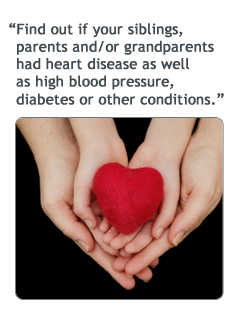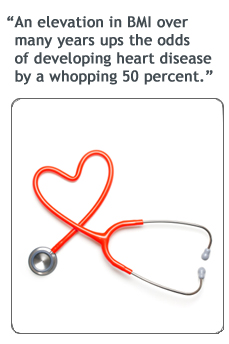According to the Centers for Disease Control and Prevention (CDC), coronary heart disease is a major killer in the U.S., resulting in more than 400,000 deaths each year. Other cardiac conditions from irregular heart rhythms, heart failure and congenital defects also take a serious toll. But consider this good news: the CDC also says a vast number of cardiovascular woes can be prevented.
For example, we've all heard that lowering cholesterol, keeping weight in check and blood pressure under control, not smoking and exercising regularly can go a long way in helping to prevent heart problems. However, there are some less well-known lifestyle changes and strategies that can be vital to maintaining a healthy ticker, too.
Ten ways to be extra heart smart, at any age:
Have a heart-to-heart talk with your family. Don't know your family's health history? Ask questions. Find out if your siblings, parents, and/or grandparents had heart disease as well as high blood pressure, diabetes and other conditions that raise the risk for cardiovascular disease. This information can provide specific clues about your possible risk of heart problems now and as you grow older, so you can share this information with your doctor at your next check-up. While you can't erase your family history, it doesn't mean you are doomed to have a heart attack because several relatives did. Instead, your family health history can help guide you and your doctor to aggressively modify risk factors that you can control.
At risk for a specific genetic-linked heart condition? Get screened early. If you learn a relative had a heart condition with a strong genetic component, such as an aortic aneurysm (a bulge in a section of the body's main artery that can stretch and rupture), talk to your doctor about screening with imaging tests. The John Ritter Foundation notes that aortic aneurysms are the thirteenth leading cause of death in the U.S. and immediate relatives (parents, siblings and children) of a person with the condition are at increased risk. After actor John Ritter's death from a sudden aortic aneurysm rupture, his younger brother was screened and a similar heart condition was detected -- fortunately, it was found early and successfully repaired.

Check out your BMI, not just your lbs. Being overweight is a risk factor for cardiovascular disease, but just knowing your weight may not be as important as understanding your BMI (body mass index). The reason? Researchers have found that your BMI, a number calculated from your weight and height, provides a quick estimate of body fat -- an elevated BMI means excess body fat and an elevated risk for heart disease. In fact, a new study from scientists at the University of Bristol in the U.K. and Copenhagen University Hospital concludes that an elevation in BMI over many years ups the odds of developing heart disease by a whopping 50%. Fortunately, it's easy to track your BMI and watch it go from elevated to a heart healthier range as you exercise and lose weight. Just type your weight and height into this free online BMI calculator provided by the by the National Heart, Lung, and Blood Institute (NHLBI): http://www.nhlbisupport.com/bmi/.
Know your vitamin D status. In recent years, scientists have made several startling discoveries about vitamin D. It turns out that low levels of vitamin D are far more widespread than previously realized. What's more, a lack of vitamin D has been linked to a host of health problems -- including heart disease. Recently, University of Kansas researchers analyzed data on more than 10,000 patients and found 70% were vitamin D deficient. These people were also at an elevated risk for a variety of heart ailments. However, taking vitamin D supplements dramatically reduced the risk of heart disease. Talk to your doctor about checking your vitamin D status with a blood test to see if you might benefit from supplements.
Protect your gums and teeth (your heart will thank you for it). Sure, flossing, brushing and seeing your dentist regularly can keep your smile bright and your gums healthy. But it may also keep cardiovascular disease at bay. Scientist Moise Desvarieux, MD, PhD, infectious disease epidemiologist at Columbia University's Mailman School of Public Health, says there appears to be a link between oral health and cardiovascular disease, although no one can say for sure if periodontal disease (gum inflammation) actually causes heart disease. "Our research brings in the microbiological factors that may connect the two diseases," Dr. Desvarieux explains. He hypothesizes that bacteria from gum infections enter the bloodstream and create inflammation in other parts of the body -- including the cardiovascular system.

Eat more chocolate (really)! There's nothing heart healthy about eating sugar and fat laden chocolate-flavored candy bars. However consuming a few ounces of plain chocolate daily -- especially the dark kind -- can significantly lower blood pressure and reduce the risk of heart disease, according to research published in the European Heart Journal.
Meditate for your heart's sake. Transcendental meditation (TM) is one of several forms of meditation that has received serious scientific scrutiny in recent years. The outcome? Not only does meditation score high as a stress-buster, but it also offers substantial heart benefits. For example, a study funded by the National Institutes of Health's NHLBI found patients with coronary heart disease who practiced TM had a nearly 50% lower rate of heart attack, stroke and death compared to a matched group that didn't meditate.
Get the facts on "skipped beats." Almost everyone feels their heart "skip" a beat or beat very fast sometimes. Most often, these palpitations are harmless premature beats caused by too much caffeine, a sudden fright or not getting enough sleep. However, they can be signs of arrhythmia (an abnormal or irregular heartbeat). According to the American Heart Association, most cases are harmless. But some arrhythmias up the risk for strokes and even sudden death, and require treatment and management. If you have frequent palpitations, especially if they are accompanied by dizziness, feeling faint, shortness of breath, fatigue and/or chest pain, talk to your doctor to see if tests are needed to screen for possible serious problems.
Cook the heart-healthy way. How you cook is as important as what your cook when it comes to heart-healthy fare. The Mayo Clinic advises using herbs for flavor instead of extra salt, and roasting, grilling and sautéing instead of frying to cut back on fat and calories. For example, just one extra tablespoon of oil used in frying adds more than 100 calories. When recipes call for oils, pick those rich in monosaturated fats (such as olive, canola and peanut oils) to help lower LDL, the "bad" cholesterol.
Take charge of your heart health. While it's true heart disease is the nation's number one killer of both men and women, don't let the statistics frighten you. A positive attitude and making lifestyle changes can improve and protect your heart health now and in future years. To that end, the American Heart Association has created a free heart risk assessment program with online tools to help you start living a healthier life today. Check out Life's Simple 7™: http://mylifecheck.heart.org/Multitab.aspx?NavID=3


